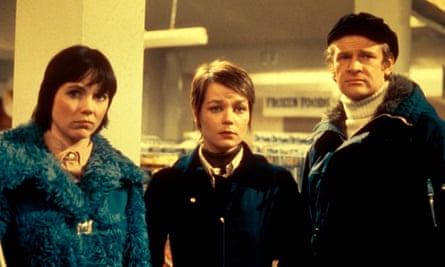More than a few times in the past months, Adrian Hodges has been called a prophet. “I don’t think I am,” the writer shrugs. “It’s Terry Nation who should be called that.”
It was 12 years ago, in the thick of the last global financial crisis, that Hodges’ re-engineered take on Terry Nation’s savagely bleak, post-apocalyptic 1970s drama Survivors debuted on BBC One. In its first episode, audiences saw the UK ravaged by a virus that would, before the end credits rolled, decimate 99% of the planet’s population. The following two series followed a motley band of survivors, as they navigated their way through this strange new, lawless, electricity-free world. It was, effectively, The Walking Dead before The Walking Dead.
In 2008, Sars and bird-flu would have been fresh in the heads of the 6.97 million viewers who tuned into that first, movie-length episode. Today, Survivors feels bitingly prescient – so much so that Hodges has been shy of revisiting it. “I couldn’t watch that first season again. It’s too harrowing,” he says. “It’s so close to what we’re going through now.”
Viewers with longer memories would have remembered Dalek-creator Terry Nation’s original. But that version peaked with its first series; Nation left the show after clashes with his producer, Terence Dudley. The second two seasons, overseen by Dudley, became more The Good Life than Threads, more concerned with crop rotations and salt-harvesting than the vigilante violence and kangaroo courts of Nation’s era.

Hodges was approached by the BBC to rework the show after his work on ITV’s dino-drama Primeval. He revved up the pace, amped up the action and looked closely at the origins of the disease, something the original series had never done. In Hodges’ Survivors, it is revealed that the virus was accidentally created by a shady medical research company. which, when the sheer scale of the outbreak became clear, began whisking the great and the good to a secret island in order to rebuild society. In the last episode, screened in February 2010, pharmaceutical honcho Michael Landry (Patrick Malahide) was seen jetting off to the island, vaccine in hand, with a stowaway – Max Beesley’s jailbird antihero – hidden in the plane’s cargo hold.
That humdinger of a cliffhanger was supposed to lead into a third series. But crumbling ratings put an early end to Survivors. Viewing figures had fallen from an average of 5.5 million on series one to a BBC-bothering low of 3.82 million on series two. It not hard to see why ratings were haemorrhaging. There are chinks of light in that first series, but Hodges’ more serialised sophomore season was an uncommonly gloomy watch for a BBC One 9pm audience. Even the grisliest post-watershed BBC dramas don’t include manacled slaves sweating it out in coal mines or Josef Mengele-like experiments on captured survivors.
Was Survivors a case of the right show, at the wrong time? Or even the right show on the wrong channel? “It was a very grim story at a time, in the aftermath of the economic meltdown, when people wanted something happier,” suggests Hodges. “Also it was just never naturally a BBC show. Now, I think, it would be on Netflix or Showtime.” In fact, there was talk a few years ago, after the two series of Survivors proved a hit on Netflix, that the streaming giant might pick it up and continue the story, as they have various other BBC-abandoned shows such as The Last Kingdom. “That wonderful sci-fi audience was really coming out in numbers to watch it,” Hodges says, “but, sadly, talk of reviving it never came to anything.”
Season three would, in Hodges’ words, “have been the clash between lifestyles – what kind of society would you want to live in if you had the chance to start again?” Even 10 years on, the cancellation is a painful memory for its writer. “It breaks my heart,” he says. “It’s a show I’m very proud of.”
As brutally relevant as Survivors currently is, neither Nation’s nor Hodges’ versions have been added to iPlayer boxsets, and they are not available to stream anywhere. If you want to see a British TV series about a viral pandemic during a viral pandemic, you have to pay.
“I think there’ll be a time and a place for them to show it again, but perhaps not during this particular crisis,” Hodges. “But I can understand, from a taste point of view, why the BBC haven’t put it on iPlayer.”
The Walking Dead launched just eight months after Survivors signed off and, in many ways, picked up its post-apocalyptic baton. It is now 10 series in, a longevity at which Hodges can only marvel.
Given how much he has been reflecting on Survivors recently, is there anything Hodges would do differently, now, given what we have all experienced over the past few months?
“The only thing we didn’t do,” he muses, “is reflect how kind and how decent people are. Certainly, on a day-to-day basis, I think we’ve behaved wonderfully well in this crisis. We kind of skipped the ‘people being kind’ bit, but only because our virus was so much more virulent than the one we’ve actually got. Though God knows this one is bad enough!”
Survivors is available to buy from Amazon Prime

Comments (…)
Sign in or create your Guardian account to join the discussion